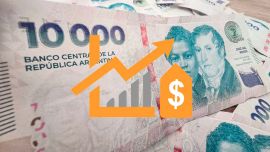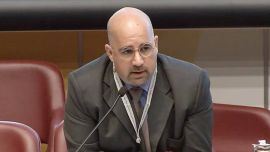Argentina unveiled a proposal to restructure foreign bonds that would push back the majority of its debt payments to the next decade.
Holders of the country’s overseas debt are being offered a series of new securities of various maturities, none of which will accrue interest before 2022. No principal will be returned before 2026.
If accepted by investors, the proposal would significantly reduce the country’s short-term debt payments, part of the government strategy to buy itself enough time to shore up its finances and the economy. For a nation that has defaulted twice in the past two decades, the fact investors won’t get much of their money back within 10 years will come as a concern, though no surprise at this point.
Argentina presented the broad terms of the offer on April 16, which included a three-year moratorium on debt payments, a 62 percent reduction in interest payments and a five percent cut in principal. Friday’s more detailed offer revealed the specific maturities of the new bonds being offered and showed that none of them start with an interest rate of more than 0.6 percent, well below what’s typical for emerging-market notes.
“They’re borrowing for the next 15 years at US Treasury bond 30-year rates,” said Martin Schubert, founder and chief executive officer of European InterAmerican Finance Corp., who is advising a group of retail investors with Argentine bonds. “Does that make sense? Argentina isn’t the US Treasury.”
The offer would stick creditors holding US$66 billion of bonds with massive losses. It instantly recalled the country’s 2005 debt restructuring, considered one of the harshest sovereign bond renegotiations in modern history.
Still, Argentine bonds had rallied Friday before the final details, a sign investors had anticipated even worse terms. Dollar-denominated notes due next year gained the most on record on a percentage basis, climbing 3.2 cents to 33.3 cents on the dollar.
Argentina’s economy, currently at a standstill under nationwide lockdown to halt the spread of coronavirus, will contract 5.7 percent in 2020, according to an International Monetary Fund forecast. That would mark its third consecutive annual contraction. Long before the pandemic punctured global growth rates, Argentina was already in shambles amid a currency crisis and double-digit inflation.
“Any offer that is high enough to be accepted will likely end up being restructured again,” said Diego Ferro, founder of M2M Capital in New York. “It’s not serious to present an offer when the impact of the quarantine is not yet determined. It adds to a situation that the government thought was terrible, even before the pandemic.”
Under the proposal, interest rates would start at zero and gradually increase, creating an average interest rate on the restructured debt of 2.33 percent. The haircut on principal is equal to US$3.6 billion, while the reduction on interest obligations totals US$37.9 billion. When presenting the outline of the offer, Economy Minister Martín Guzmán said investors would have about 20 days to respond once the offer is officially made.
Under the proposal, just one-eighth of the principal payments on the bonds are due before 2030 with the majority owed during the following decade.
Bond Menu
Holders of bonds issued in 2005 and 2010 are being offered slightly better terms than investors who hold notes that were sold in 2016. Investors will have a menu of different bonds to select from, depending on their current holdings, with the shortest-term notes maturing in 2030 and the longest ones in 2047.
Since taking office in December, President Alberto Fernández has already pushed back bond payments for some peso- and dollar-denominated securities governed by local laws. While he made those moves unilaterally, backed by a friendly court system, the bonds covered by New York law present a new test because he will have to get creditors to sign off.
Representatives from investment firms including BlackRock Inc., Pacific Investment Management Co., Ashmore Group Plc, Greylock Capital and Fintech Advisory Inc. have been involved in preliminary talks.
The country has US$3.5 billion in payments on foreign-law bonds due in the remainder of 2020, according to Buenos Aires-based consulting firm 1816 Economia y Estrategia, including US$500 million of interest due on April 22. Fernandez’s administration has also been in talks with the International Monetary Fund to rework a record US$56-billion financing agreement signed in 2018.
IMF officials said before the restructuring proposal was unveiled that a “meaningful contribution” will be necessary from private bondholders to ensure debt sustainability. Argentina has a total debt load of more than US$323 billion, equal to 89 percent of gross domestic product, and its foreign reserves have tumbled more than 40 percent over the past year to $43.8 billion.
by Scott Squires, Ben Bartenstein, Jorgelina do Rosario & Patrick Gillespie, Bloomberg






















Comments